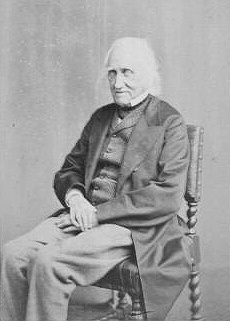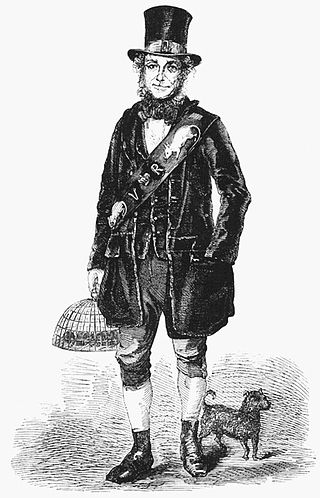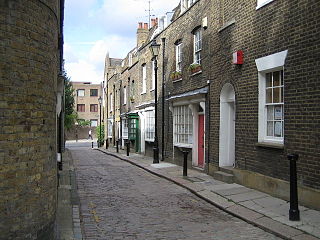
A mudlark is someone who scavenges the banks and shores of rivers for items of value, a term used especially to describe those who scavenged this way in London during the late 18th and 19th centuries. The practice of searching the banks of rivers for items continues in the modern era, with newer technology such as metal detectors sometimes being employed to search for metal valuables that may have washed ashore.

Charles Knight was an English publisher, editor and author. He published and contributed to works such as The Penny Magazine, The Penny Cyclopaedia, and The English Cyclopaedia, and established the Local Government Chronicle.
Clara Collet was a British economist and civil servant. She was one of the first women graduates from the University of London and was pivotal in many reforms which greatly improved working conditions and pay for women during the early part of the twentieth century. She is also noted for the collection of statistical and descriptive evidence on the life of working women and poor people in London and elsewhere in England.

A costermonger, coster, or costard is a street seller of fruit and vegetables in British towns. The term is derived from the words costard and monger (seller), and later came to be used to describe hawkers in general. Some historians have pointed out that a hierarchy existed within the costermonger class and that while costermongers sold from a handcart or animal-drawn cart, mere hawkers carried their wares in a basket.

Rees's Cyclopædia, in full The Cyclopædia; or, Universal Dictionary of Arts, Sciences, and Literature was an important 19th-century British encyclopaedia edited by Rev. Abraham Rees (1743–1825), a Presbyterian minister and scholar who had edited previous editions of Chambers's Cyclopædia.

Charles James Booth was a British shipowner, Comtean positivist, social researcher, and reformer, best known for his innovative philanthropic studies on working-class life in London towards the end of the 19th century.
Sir Frederick Morton Eden, 2nd Baronet, of Maryland was an English writer on poverty and pioneering social investigator.

London Labour and the London Poor is a work of Victorian journalism by Henry Mayhew. In the 1840s, he observed, documented and described the state of working people in London for a series of articles in a newspaper, the Morning Chronicle, which were later compiled into book form.

Socialism: Utopian and Scientific is a short book first published in 1880 by German-born socialist Friedrich Engels. The work was primarily extracted from a longer polemic work published in 1878, Anti-Dühring. It first appeared in the French language.

Little Green Street is an 18th-century street in London, located off Highgate Road in Tufnell Park.
Southwark and Bermondsey was an inner city constituency in London, United Kingdom. Its sole Member of Parliament was Simon Hughes, in the first stage of his career in the house, as a Liberal then Liberal Democrat after the party's founding in 1988. It was replaced with the North Southwark and Bermondsey seat in 1997.

Lonsdale Square is a garden square in the Barnsbury district of Islington, North London. It is bounded by unusual Tudor Gothic Revival terraced houses, with picturesque gables and Elizabethan-style windows, and is probably unique among squares. All the houses are listed buildings. The central public garden contains flower beds and mature trees.
Maurice Eden Paul was a British socialist activist, physician, writer and translator.
The Darwin Industry refers to historical scholarship about, and the large community of historians of science working on, Charles Darwin's life, work, and influence. The term "has a slightly derogatory connotation, as if the scale of the research has gotten out of control with people cranking out studies on perhaps less and less important aspects of Darwin's work"; but it was originally a self-designation of the scholars who began re-evaluating Darwin and studying his manuscripts and correspondence in the second half of the 20th century.

Dorset Street was a street in Spitalfields, East London, once situated at the heart of the area's rookery. By repute it was "the worst street in London", and it was the scene of the brutal murder of Mary Jane Kelly by Jack the Ripper on 9 November 1888. The murder was committed at Kelly's lodgings which were situated at No. 13, Miller's Court, entered from a passageway between 26 and 27, Dorset Street.

The East End of London, often referred to within the London area simply as the East End, is the historic core of wider East London, east of the Roman and medieval walls of the City of London and north of the River Thames. It does not have universally accepted boundaries on its north and east sides, though the River Lea is sometimes seen as the eastern boundary. Parts of it may be regarded as lying within Central London. The term "East of Aldgate Pump" is sometimes used as a synonym for the area.

The Poverty of Philosophy is a book by Karl Marx published in Paris and Brussels in 1847, where he lived in exile from 1843 until 1849. It was originally written in French as a critique of the economic and philosophical arguments of French anarchist Pierre-Joseph Proudhon set forth in his 1846 book The System of Economic Contradictions, or The Philosophy of Poverty.

Capital: A Critique of Political Economy, also known as Capital, is a foundational theoretical text in materialist philosophy and critique of political economy written by Karl Marx, published as three volumes in 1867, 1885, and 1894. The culmination of his life's work, the text contains Marx's analysis of capitalism, to which he sought to apply his theory of historical materialism "to lay bare the economic law of motion of modern society", following from classical political economists such as Adam Smith and David Ricardo. The text's second and third volumes were completed from Marx's notes after his death and published by his colleague Friedrich Engels. Das Kapital is the most cited book in the social sciences published before 1950.
David Englander was a British historian of labour and poverty, and of soldiers in the World Wars, and was an authority on the work of Charles Booth and Jewish immigration to Britain.

Wilmington Square is a garden square in Clerkenwell, Central London. It is bounded by Regency and Victorian terraces, most of which are listed buildings. The central public gardens contain flower beds and mature trees, a pavilion or shelter, and a water fountain.













